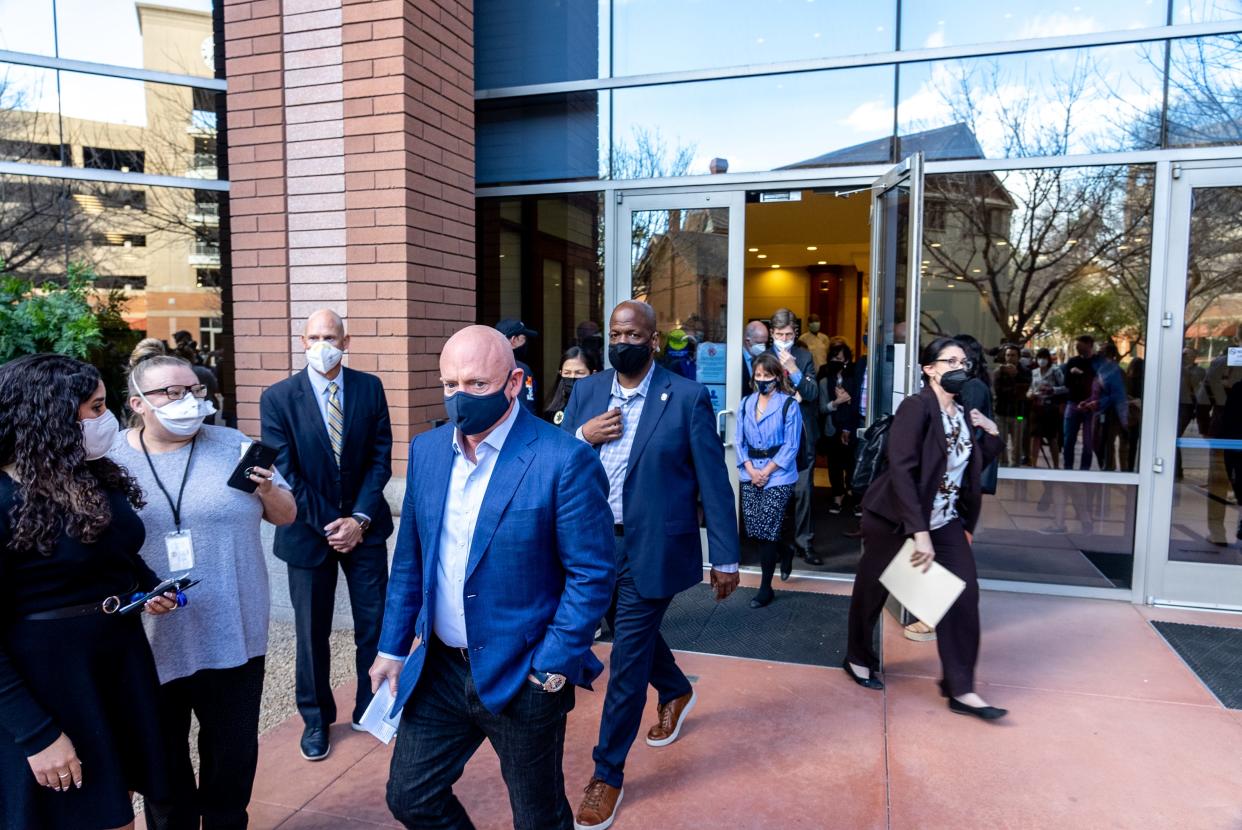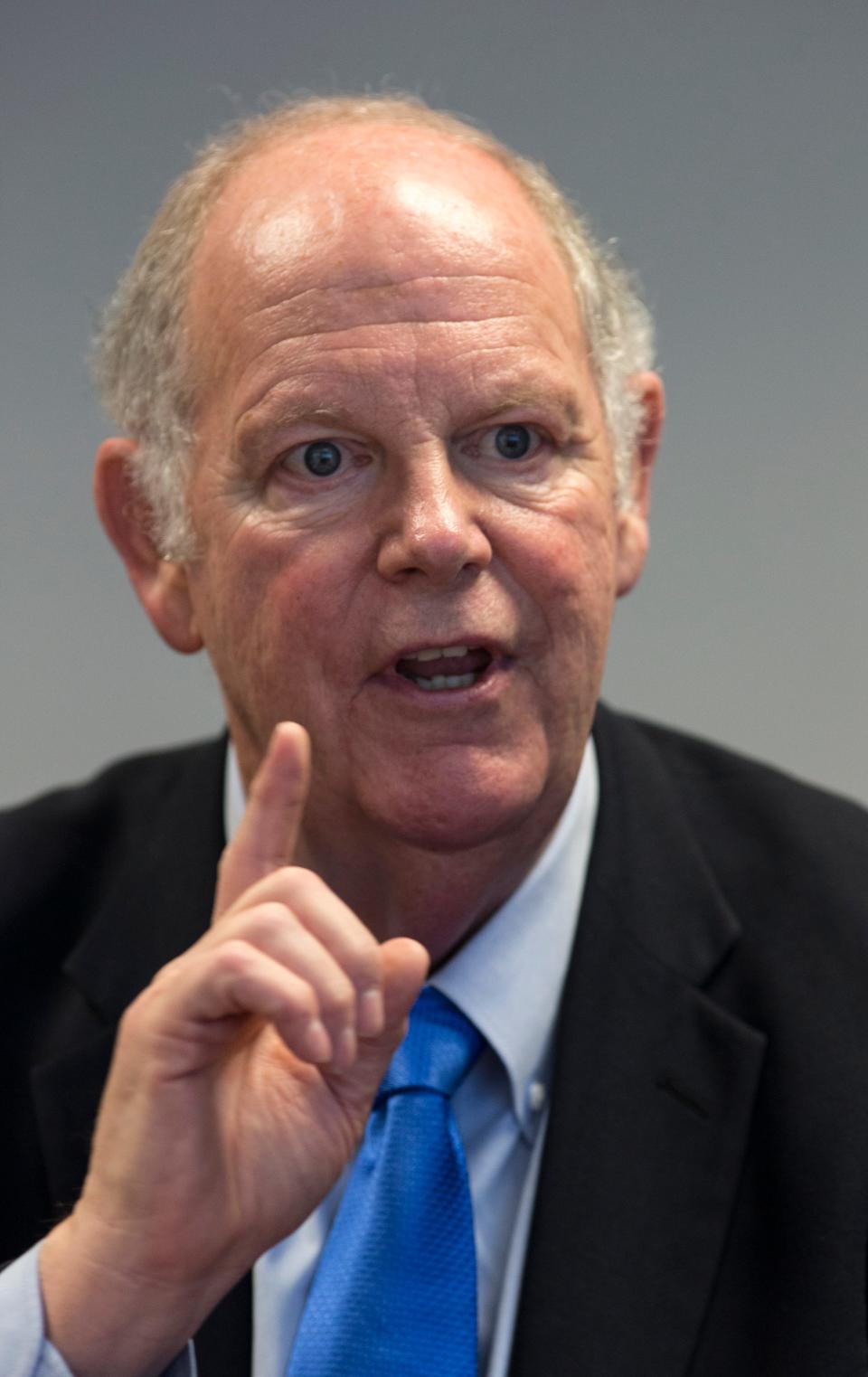Arizona congressional races slightly clearer after primary qualification deadline passes

- Oops!Something went wrong.Please try again later.
Arizona's field of congressional candidates became slightly clearer after Monday's deadline to submit signatures to qualify for the Aug. 2 primary.
For now at least, there was no big surprise: The expected field of challengers produced enough signatures to potentially make the ballot, and most incumbents will face no challengers from their own party.
The anticlimactic showing stands in contrast to 2020, when Shay Stautz, a Tucson Republican expected to contend for the GOP nomination, dropped out of the race ahead of challenges to the signatures his campaign gathered. In 2018, Republican Seth Leibsohn failed to qualify for the ballot because of a surprise signature shortage.
This time most of Arizona's incumbents, who are running new congressional districts across the state, have a path to at least their party's nomination.
Sen. Mark Kelly, D-Ariz., easily collected the most signatures in his bid for re-election. Five Republican challengers also made the ballot with room to spare. They are Mark Brnovich, Jim Lamon, Blake Masters, Mick McGuire and Justin Olson. Libertarian Marc Victor also qualified for his party's primary.
In the House races, Rep. David Schweikert, R-Ariz., occupies what could be Arizona's most competitive district, which includes much of the northeast Valley. He is slated to face two Republican challengers: Josh Barnett and Elijah Norton. Three Democrats — Jevin Hodge, Adam Metzendorf and Ginger Torres — will compete for the right to challenge whoever emerges from that primary.
Norton pulled in more signatures than Schweikert, who is seeking a seventh term in Washington.
Rep. Tom O'Halleran, D-Ariz., is considered as the state's most endangered incumbent after the new congressional map put him in a district that still includes northeastern Arizona, but now includes the Prescott area, and voted for former President Donald Trump by about 7 percentage points in 2020.

The three-term Democrat is unopposed in the primary, but has seven GOP challengers contending for the chance to knock him off.
They include: Walt Blackman; Eli Crane; Mark DeLuzio; Steven Krystofiak; John Moore; Ron Watkins; and Andy Yates.
A Tucson-based district that has no incumbent running has eight contenders trying to replace the retiring Rep. Ann Kirkpatrick, D-Ariz.
For the Democrats, Avery Anderson, Kirsten Engel and Daniel Hernandez made the primary ballot.
The Republicans are Juan Ciscomani, Lucretia Free, Brandon Martin, Young Mayberry and Kathleen Winn.
Rep. Paul Gosar, R-Ariz., has three GOP challengers in his new western Arizona district. They are Sandra Dowling, Randy Kutz and Adam Morgan. The winner is likely headed to Washington, with no Democrats qualifying in what is likely the state's most Republican-leaning district.
Rep. Greg Stanton, D-Ariz., has no Democratic challengers in his new, Tempe-based district, but there are plenty of Republicans hoping to block his path to a third term. They include: Kelly Cooper, Jerone Davison, Dave Giles, Rene Lopez, Alex Stovall and Tanya Wheeless.
Rep. Debbie Lesko, R-Ariz., was perhaps the biggest winner with no Democrats or Republicans qualifying to challenge her for another two years in Washington representing the northwest Valley.
Reps. Andy Biggs, R-Ariz., and Ruben Gallego, D-Ariz., each have one challenger from the opposite party in their districts, neither of which are likely to produce electoral upsets. Democrat Javier Ramos has no competition for the right to face Biggs. Likewise, Republican Jeff Zink has no challengers for the GOP nomination against Gallego.
Zink's status is more tenuous: He qualified with the exact number of signatures needed. Arizona voters have until April 18 to formally challenge the signatures the campaigns gathered, which could erase at least some of their totals.
Rep. Raúl Grijalva, D-Ariz., the dean of the state's congressional delegation, has two Republican challengers in his bid for an 11th term representing southwestern Arizona. They are Nina Becker and Luis Pozzolo.
Reach the reporter Ronald J. Hansen at ronald.hansen@arizonarepublic.com or 602-444-4493. Follow him on Twitter @ronaldjhansen.
Support local journalism. Subscribe to azcentral.com today.
Subscribe to our free political podcast, The Gaggle.
This article originally appeared on Arizona Republic: Congressional candidate field narrows in Arizona primary election

